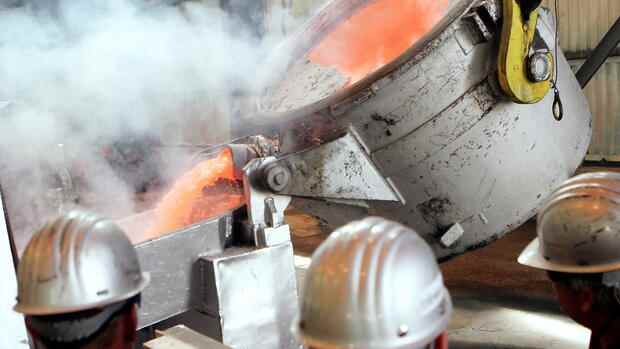The high cost of electricity is becoming a serious problem for the industry. Production reductions are the result.
(Photo: ddp images/dapd)
Berlin A large majority of companies in Germany are hoping for considerable relief from an industrial electricity price that applies throughout Europe. This is confirmed by a survey by the opinion research institute Civey for the SPD economic forum.
According to the survey, around 75 percent of the 1,300 companies surveyed are counting on the federal government to work towards a competitive, uniform industrial electricity price at European level in the short term. 82 percent are in favor of a national solution that can be implemented quickly if a Europe-wide agreement cannot be reached quickly.
Since the start of the Russian war of aggression against Ukraine, the already high level of energy prices in Germany has risen more than in many other countries. German industry is now paying wholesale gas prices for 2023 that are eight times higher than in the USA. Electricity prices have also increased more in Germany than in other regions of the world.
The high price level has become a major burden for many companies.
This applies to the manufacturing industry and in particular to energy-intensive sectors such as steel, chemicals, paper, glass and cement. Sectors that are not able to pass on the higher costs for electricity and gas to their customers because they are in international competition are particularly affected. They sometimes compete against competitors from other regions of the world, who only have to bear a fraction of the energy costs of companies in Germany.
Top jobs of the day
Find the best jobs now and
be notified by email.
An example from the aluminum industry shows how striking the consequences are. According to the industry, about 15 megawatt hours (MWh) of electricity are required to produce one ton. With an electricity price of 600 euros per MWh as in August 2022, that is 9000 euros in electricity costs for one ton of aluminum. On the world market, aluminum is currently traded for around 2400 euros per ton. At current electricity prices, the production of one tonne in Germany means a loss of 6,600 euros per tonne.
It is true that many industrial companies benefit from long-term electricity procurement contracts, which currently protect them from the consequences of the current price increases. However, they often obtain part of their electricity at short notice. The high price level therefore has an impact, at least in part, and is always noticeable when companies have to conclude new long-term supply contracts.
Electricity prices: companies fear for their existence
The federal government has launched an energy cost containment program (EKDP) for the economy. With the recently approved third relief package, the group of companies that can make use of the EKDP has been significantly expanded. However, the EKDP is limited in time. The application process is also considered complicated.
From the point of view of the economy, an industrial electricity price that applies permanently would be the clearer and more reliable solution. The companies wanted “a solution to stabilize the completely out of control energy prices,” said Ines Zenke, President of the SPD Economic Forum.
Energy prices have now developed into an existential threat for companies, medium-sized companies, family businesses and craft businesses, said Zenke. Politicians must now “strive for a speedy solution at European level,” she demanded. “If this is not possible in the short term, national intervention is urgently needed. Otherwise we will massively endanger the German economy, with unforeseeable consequences for society as a whole,” warned Zenke.
Zenke receives support, for example, from the German Chemical Industry Association (VCI): “Our companies are running out of time. In the short term, we have to use all instruments to lower the exorbitant prices on the electricity and gas markets as quickly as possible,” said VCI Managing Director Wolfgang Große Entrup. “Many of our medium-sized companies have their backs to the wall. You need help now.” There is “no way around an internationally competitive industrial electricity price”.
The Wirtschaftsvereinigung Metalle (WVM) has developed concrete ideas for the amount of such an industrial electricity price: The industrial electricity price should therefore be based on the average electricity price of the last ten years. According to the WVM, this results in a value of 41.74 euros per megawatt hour (MWh). The trade association points out that this roughly corresponds to the level of the industrial electricity price at which industrial customers in France have been able to purchase electricity for years due to government regulation.
In addition, the value also corresponds to a promise that Olaf Scholz made to industry a good year ago, at that time still as the SPD’s candidate for chancellor: “My goal is an industrial electricity price of four cents” per kilowatt hour of electricity, Scholz said in May 2021. The value of four cents per kilowatt hour corresponds to 40 euros per megawatt hour.
More: Cold withdrawal of Russian gas – Germany is threatened with an emergency winter
